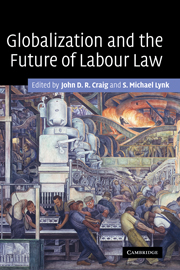Book contents
- Frontmatter
- Contents
- Notes on contributors
- Acknowledgements
- Table of cases
- List of abbreviations
- Introduction
- PART I Perspectives on globalization
- PART II International labour standards
- PART III The European Union
- PART IV The Americas
- PART V The ILO
- 12 International labour standards in the globalized economy: obstacles and opportunities for achieving progress
- 13 The growing importance of the International Labour Organization: the view from the United States
- PART VI Labour rights
- Bibliography
- Index
12 - International labour standards in the globalized economy: obstacles and opportunities for achieving progress
Published online by Cambridge University Press: 23 July 2009
- Frontmatter
- Contents
- Notes on contributors
- Acknowledgements
- Table of cases
- List of abbreviations
- Introduction
- PART I Perspectives on globalization
- PART II International labour standards
- PART III The European Union
- PART IV The Americas
- PART V The ILO
- 12 International labour standards in the globalized economy: obstacles and opportunities for achieving progress
- 13 The growing importance of the International Labour Organization: the view from the United States
- PART VI Labour rights
- Bibliography
- Index
Summary
Introduction
Various arguments have been advanced over the years in support of international labour standards (ILS). They include: the contribution that ILS would make to social justice and social peace; the nature of labour standards as part and parcel of basic human rights; the consolidation of national labour legislation; their potential as a basis for national action; and their equally important potential for regulating international competition.
The call for international labour law to regulate international competition arose prior to World War I during the first major wave of international economic integration. At that time, each country could easily trade with any other country. Tariffs were low, and the gold standard facilitated the financing of trade and investment. From its inception in 1919, the International Labour Organization (ILO) claimed that unregulated cross-border trade and investment flows would depress labour conditions and create hardships for workers. The remedy to “social dumping” (as it was called initially) or the “race to the bottom” (as it was later termed in trade union circles) would be international action for the achievement of universal minimum labour standards. To be effective, all potential market players would have to obey the same norms. Actual compliance with the law should keep defectors from gaining an unfair competitive advantage. The application of ILS would have to be coextensive with the size of the labour, commodity and capital markets. The ILO is certainly aware of these functional requirements.
- Type
- Chapter
- Information
- Globalization and the Future of Labour Law , pp. 331 - 355Publisher: Cambridge University PressPrint publication year: 2006
- 3
- Cited by



